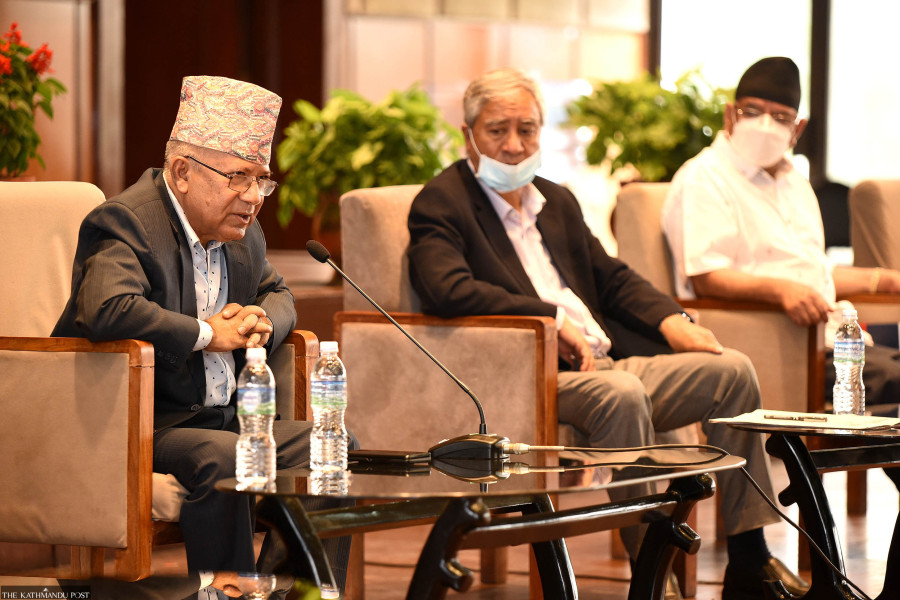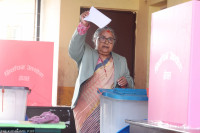Politics
Amid mixed signals, Nepal faction’s support for Deuba is not a certainty
UML leaders continue unity bid even if it means rethinking the roles of Oli and Nepal. Meanwhile, more Samajbadi Party lawmakers switch sides to support the government.
Anil Giri
Two political developments—one within the CPN-UML and the other within the Janata Samajbadi Party—on Saturday provided indications on the immediate direction of Nepali politics in the form of the fate of the Sher Bahadur Deuba government.
How these developments will take a final shape will decide whether Deuba continues as prime minister for the full term of the House of Representatives, which has some 18 months to go, or there will be midterm polls within six months. Deuba needs to take a vote of confidence in the House by August 11 failing which the House will be dissolved and snap polls called.
A group of second rung leaders of the CPN-UML on Saturday reinitiated talks for party unity in the backdrop of continuing face-off between party Chairman KP Sharma Oli and senior party leader Madhav Kumar Nepal.
“We have decided to put pressure on both Oli and Nepal to implement the 10-point proposal for party unity the task force had suggested earlier,” Gokarna Bista, a member of the task force from the Nepal faction, said. “In the larger interest of the party, its leaders and its cadres, we have decided to put pressure on both Oli and Nepal to implement the 10-point deal.”
On July 11, the 10-member task force had suggested a formula for party unity calling it a win-win solution for the warring factions.
A day later the Supreme Court overturned Oli’s decision to dissolve the House and directed the Office of the President to appoint Deuba as prime minister as per Article 76 (5) of the constitution. The support of 23 lawmakers from the Nepal faction had been a key factor for the order.
But after he was ousted as prime minister, Oli has been in an uncompromising mood.
Oli has said under no circumstance will he accommodate Nepal in the party. He has called a meeting of the party’s Central Committee for Monday where, according to some UML leaders, he, as the party chair and leader of the Parliamentary Party, will instruct all party lawmakers not to vote for Deuba when he seeks the vote of confidence in the House.
Despite the potential directive, the Nepal faction leaders say the faction will vote for Deuba as his consistent policy is to save Parliament from dissolution.
“We stood against the House dissolution on both occasions—on December 20 and May 21,” a Standing Committee member close to Nepal said on condition of anonymity. “As per our consistent policy, we should stand and vote for Deuba.”
Deuba’s Nepali Congress has only 61 seats in the 275-member House of Representatives. So far it only has guaranteed support of 49 lawmakers of the Pushpa Kamal Dahal-led Communist Party of Nepal (Maoist Centre). Besides the Nepal faction, 12 of the 32 lawmakers of the Janata Samajbadi Party too had supported Deuba’s May 21 bid for prime ministership as per Article 76 (5) of the constitution.
On Saturday, more Janata Samajbadi Party leaders from the Chairman Mahanta Thakur faction switched sides to the faction led by another Chairman Upendra Yadav which is supporting Deuba, according to party leaders.
“Today we held a meeting of the party’s Parliamentary Party in which 19 lawmakers participated,” Pradeep Yadav, Janata Samajbadi Party lawmaker of the Upendra Yadav faction said. “We discussed the role the party will play in the upcoming House session and participation in the government.”
The Deuba government has just four ministers and the Yadav faction of the Samajbadi Party is yet to join it.
It is waiting for the Election Commission to resolve the issue over the authenticity of the party which has already decided to split, according to Chairman Yadav.
“The Election Commission will begin hearing the row over the authenticity of the party and that is expected to be resolved this week,” said party chair Yadav. “After the issue of authenticity is resolved, we will join the government.”
Meanwhile, within the UML there are also fears that support of the Nepal faction to Deuba has gone so far that it may even join the government.
“If you ask me, the Nepal faction will vote for Deuba and will join the government,” party spokesperson Pradeep Gyawali said.
According to Bisnhu Rijal, a central committee member of the UML, Deuba, Dahal and Nepal have agreed to split the 25 ministerial positions with eight to the Nepali Congress and six each to the Maoist Center and the Nepal faction and the rest to the Janata Samajbadi Party and the Rastriya Janamorcha, which has one seat in the lower house.
Nepali Congress leaders are confident that a large part of the Nepal faction will vote for Deuba during the confidence vote.
“Except for some lawmakers from among the 23, most from the Nepal faction will vote for Deuba. That is the information we have,” a senior Nepali Congress leader close to the prime minister said.
Although the House session is beginning Sunday, Deuba is not expected to immediately seek a confidence vote.
“Decision to seek a vote of confidence will be taken within a few days after the House session commences. It could be around July 22 or so,” Ramesh Lekhak, a Central Working Committee member close to Deuba, told the Post.
Nepali Congress leaders also say the situation is so fluid that UML lawmakers other than the 23 who supported Deuba in the writ petition filed in the Supreme Court may support Deuba.
“We expect that since the Nepal faction is all set to vote for Deuba, more lawmakers are likely to join the Nepal faction. It's all about power politics,” the senior Congress leader said. “This government is formed under Article 76 (5) so lawmakers are free to vote using their discretion. As the party whip does not apply, those who were earlier dissatisfied with Oli, are likely to join the Nepal faction and vote for Deuba.”
That would have repercussions within the UML taking it towards an official split.
“The day the Nepal faction votes for Deuba our party unity will collapse,” said Rijal, the UML central committee member.
With neither Oli nor Nepal in a mood to compromise, talks are also underway to find an alternative to them.
“Though it is not possible to ignore the role of Oli and Nepal for a larger party unity, some leaders have suggested finding leaders from the second generation to lead the party to protect the party unity,” said Gyawali the party spokesman.
That is the only possibility since neither Oli nor Nepal are for party unity, according to Rijal.
But leaders close to Nepal argue that he should be made the Parliamentary Party leader.
“Party unity can be saved if Nepal is made Parliamentary Party leader and Subas Chandra Nembang party chair,” said Metmani Chaudhary, a lawmaker from Nepal faction.
That talks within the UML are still going on in a last ditch effort to save the party unity was the message that Nepal conveyed to Dahal when the latter went to meet him at his residence in Koteshwor, according to a member of the Dahal secretariat.
“During the meeting, Dahal asked Nepal to join the Deuba government without further delay but Nepal said that he has not decided yet to join the Deuba government because some leaders are trying to resolve the dispute inside the party and he is waiting for its final outcome,” he said on the condition of anonymity.
Some Nepali Congress leaders are aware that the support of the Nepal faction is not a certainty.
“Nepali Congress is confident that the Nepal faction will vote for Deuba but until that happens we cannot say it will happen with certainty as the Nepal faction has not officially decided on it,” said a Nepali Congress leader on the condition of anonymity.
Second rung leaders of the UML on the other hand are waiting for the warring factions within the party to come to a compromise so that it can form another government as per Article 76 (5).
“If Deuba fails to secure a vote of confidence, the President can again call for government formation as per the letter and spirit of the constitution,” said Rijal. “With the support of the Thakur faction of the Samajbadi Party then there will be a chance of the UML forming a new government under the leadership of a second rung UML leader.”




 27.41°C Kathmandu
27.41°C Kathmandu













